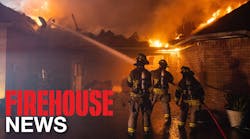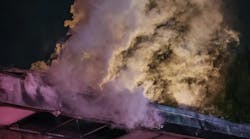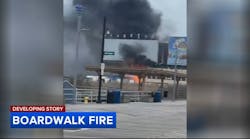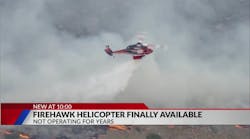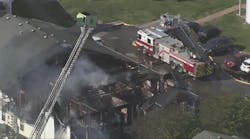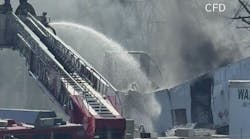Delaware fire service leaders are working on a proposal that would require firefighters, fire chiefs and company officers to have minimum levels of training.
Such a proposal would replace the current system, which allows the state's 60 volunteer companies to set their own training standards, officials said. Some companies' existing standards would meet those in the proposal.
"The time is right to do it," said Marvin Sharp, chairman of the State Fire Prevention Commission.
Several firefighters and chiefs said they generally support the proposal, though they still have questions about how the standards would affect volunteers who may have decades of experience but not the required classes.
"Why should they go back to the training when they could probably teach it?" said Roland Walker, president of the Sussex County Firemen's Association.
John P. Fox, president of the Delaware Fire Chiefs Association, said the group hasn't taken a position on the draft yet, but he thinks it's a good idea.
"It's just something we need in the fire service," Fox said. "The more you train, the better you get."
The commission and the Delaware Volunteer Firemen's Association have been circulating a draft of the requirements among firefighters and chiefs for about a month, Sharp said. Such a change would require legislative action because the commission currently does not have the authority to impose training standards, he said.
"Nothing is concrete," Sharp said. "It's just a few people's opinion. ... From what I can see, most of the reaction has been positive."
Dave Trebisacci, a senior fire protection specialist with the nonprofit National Fire Protection Association, said other states and counties have been moving toward training certification for several years, though he couldn't think of another state that has mandatory requirements.
"They're moving in the right direction," Trebisacci said of Delaware. "That puts them at least on an equal footing with their peers."
Many Delaware companies have begun requiring volunteers to gain Pro Board Certification, a training standard set by the National Board on Fire Service Professional Qualifications. Delaware's draft proposal is based on that standard, said Steve Austin, a longtime volunteer with Aetna Hose, Hook & Ladder Company in Newark and vice chairman of the board.
"People are seeing the value of this and going to get it," Austin said.
The board has set a goal of training all firefighters to the basic level by 2020, he said. The Delaware State Fire School, operated by the state commission, is accredited by the board.
"It's the minimum thing a firefighter needs to know to do their job," Austin said. "I would hope that folks in Delaware would accept the training and start to get their people through the program."
Sharp said the job of a volunteer firefighter has become more complicated in recent years: Hazardous materials are more common, electric vehicles pose unique rescue problems, houses are constructed of new materials that burn faster than old ones, and firefighters are expected to be among the first responders after a terrorist attack.
Fox said the idea of mandatory training standards has been around for many years, but it never got much traction.
"We've talked about it and talked about it," said Fox, a volunteer at Mill Creek Fire Co. for 45 years.
The absence of mandatory training standards was an issue raised in a three-day series about the volunteer fire service published last month by The News Journal. The series examined slow response times to fires and the shortage of volunteers willing or able to spend hundreds of hours in training to become a firefighter.
Sharp said one challenge will be implementing the standards without discouraging people from volunteering.
The draft proposal would give new volunteers one year to reach the most basic level of firefighter training. Certification as a Firefighter I would involve training in firefighting skills, hazardous-materials response, vehicle rescue, emergency-vehicle operation and at least basic emergency medical skills.
Subsequent courses would cover such skills as arson awareness, water rescue and wildfire suppression. Courses for officers and chiefs would include training in scene command, and other certifications would prepare volunteers to be medical officers, fire police officers or administrative officers.
Republished with permission of The News Journal.
